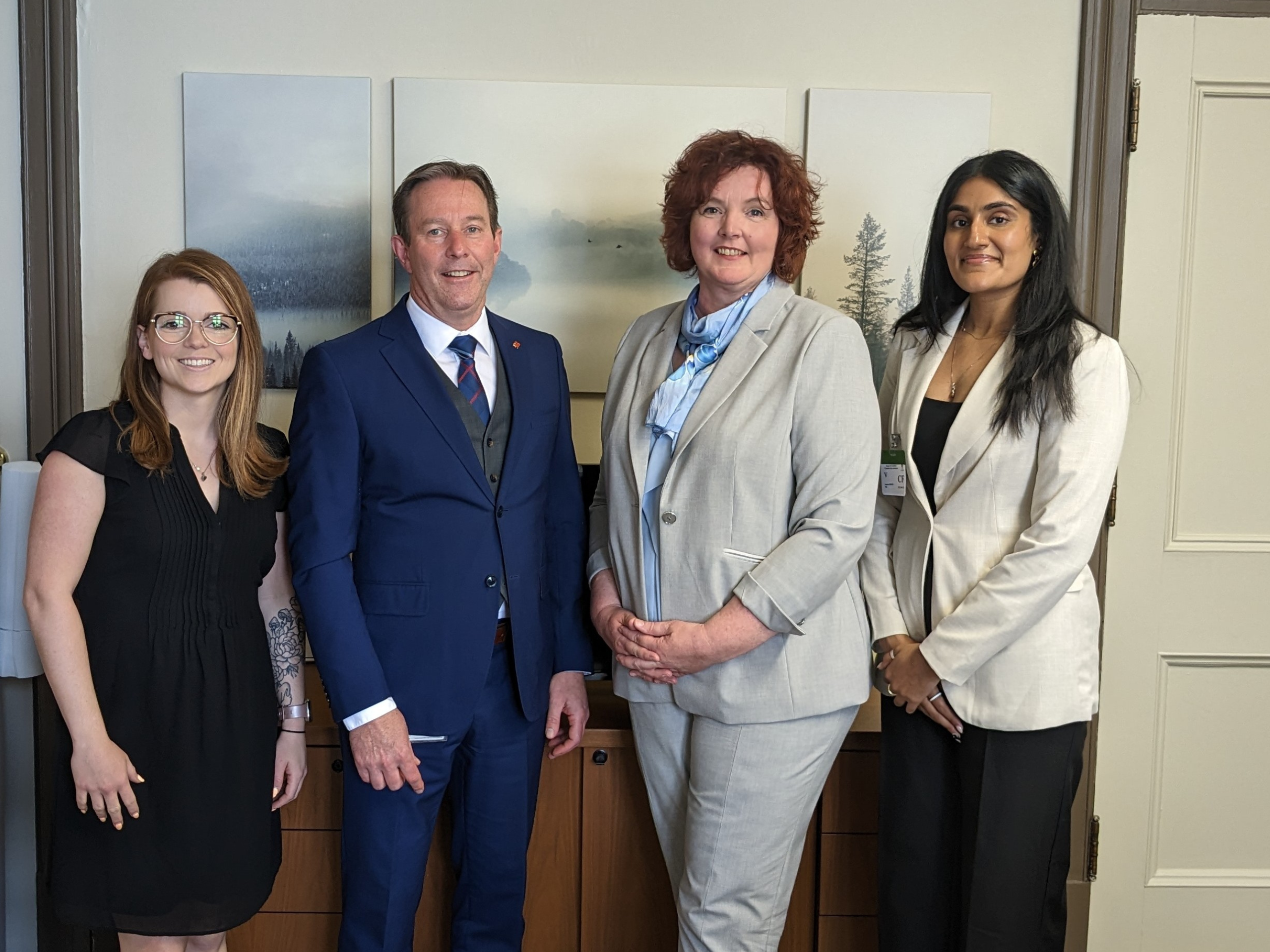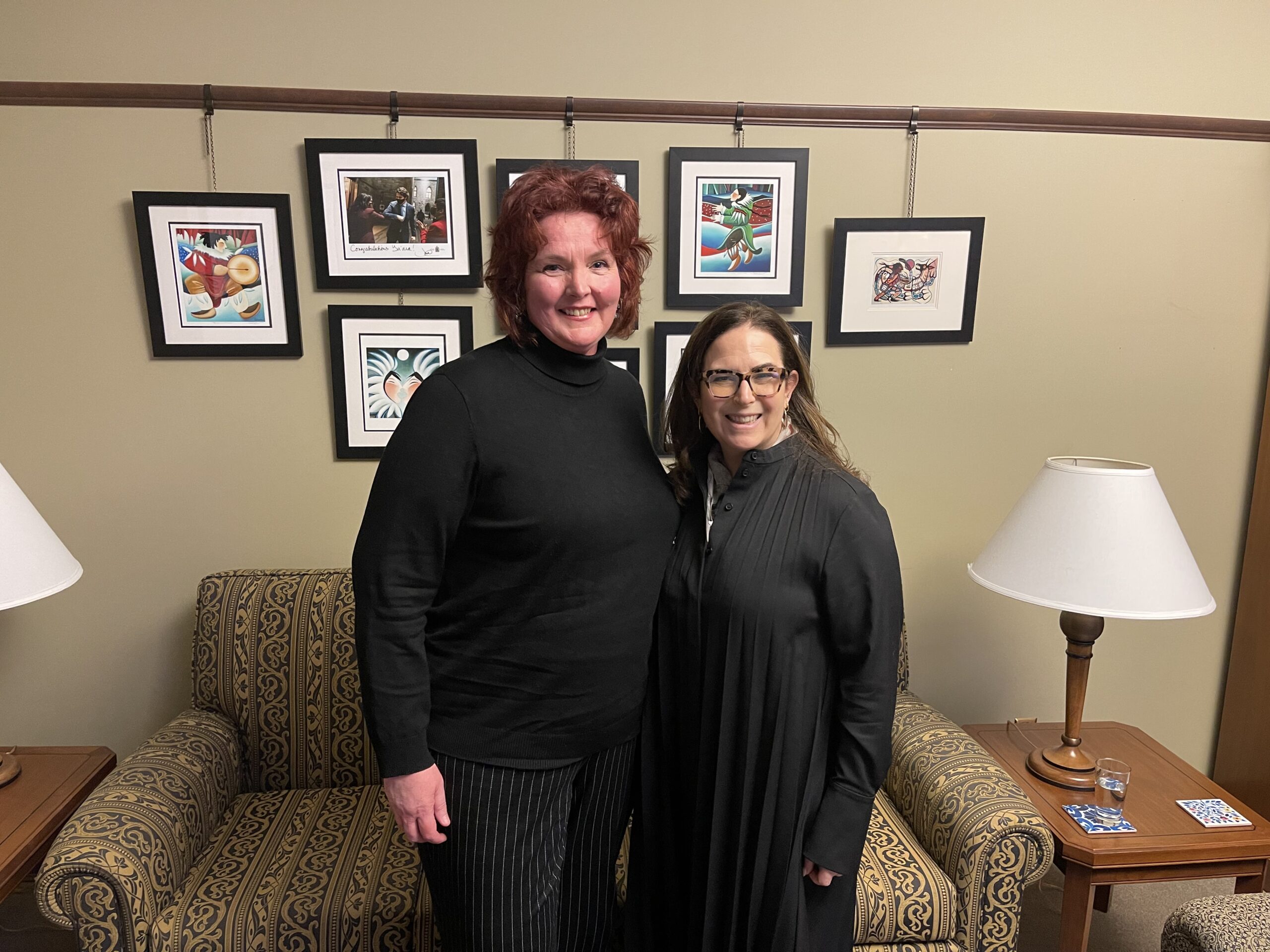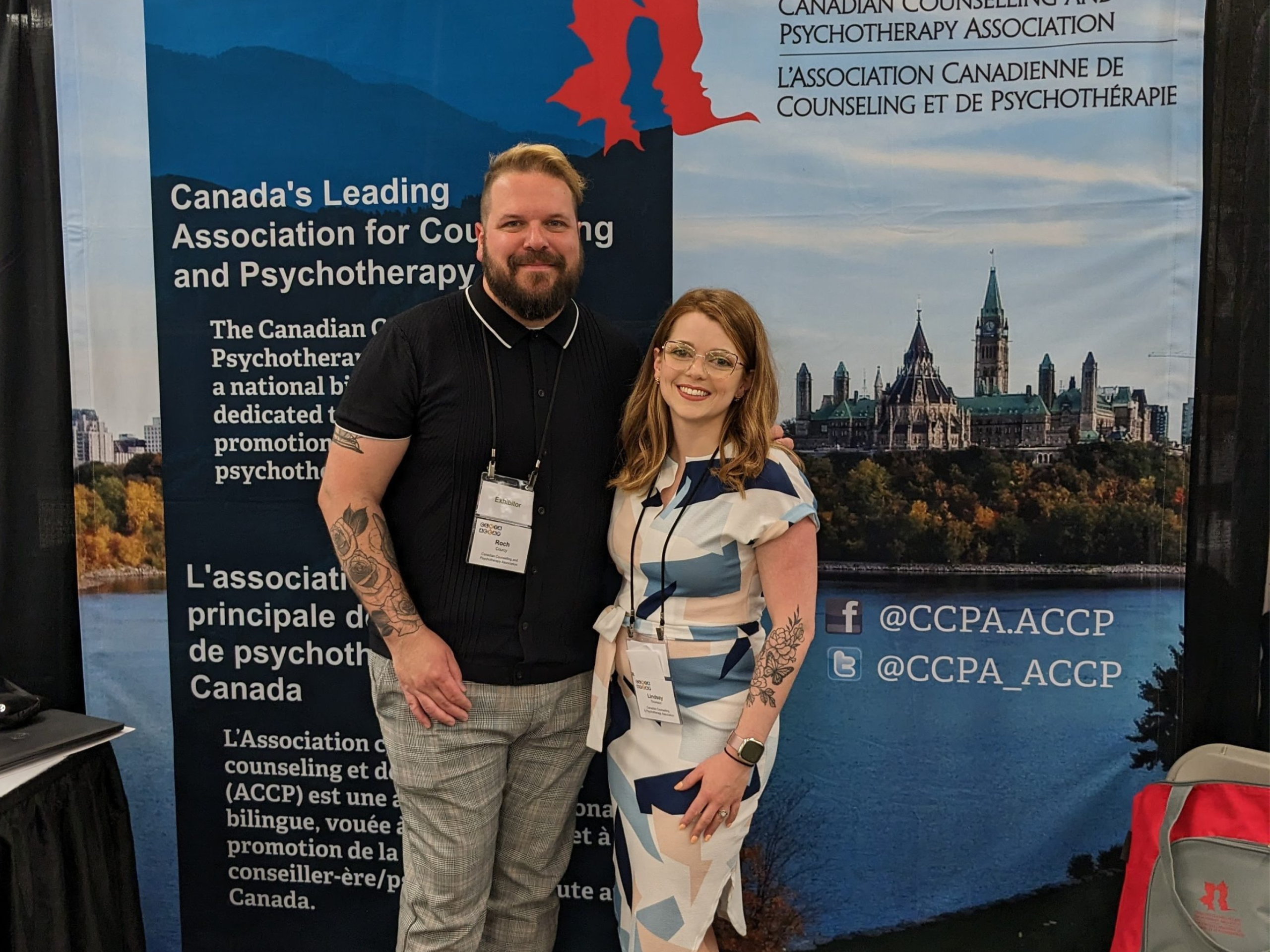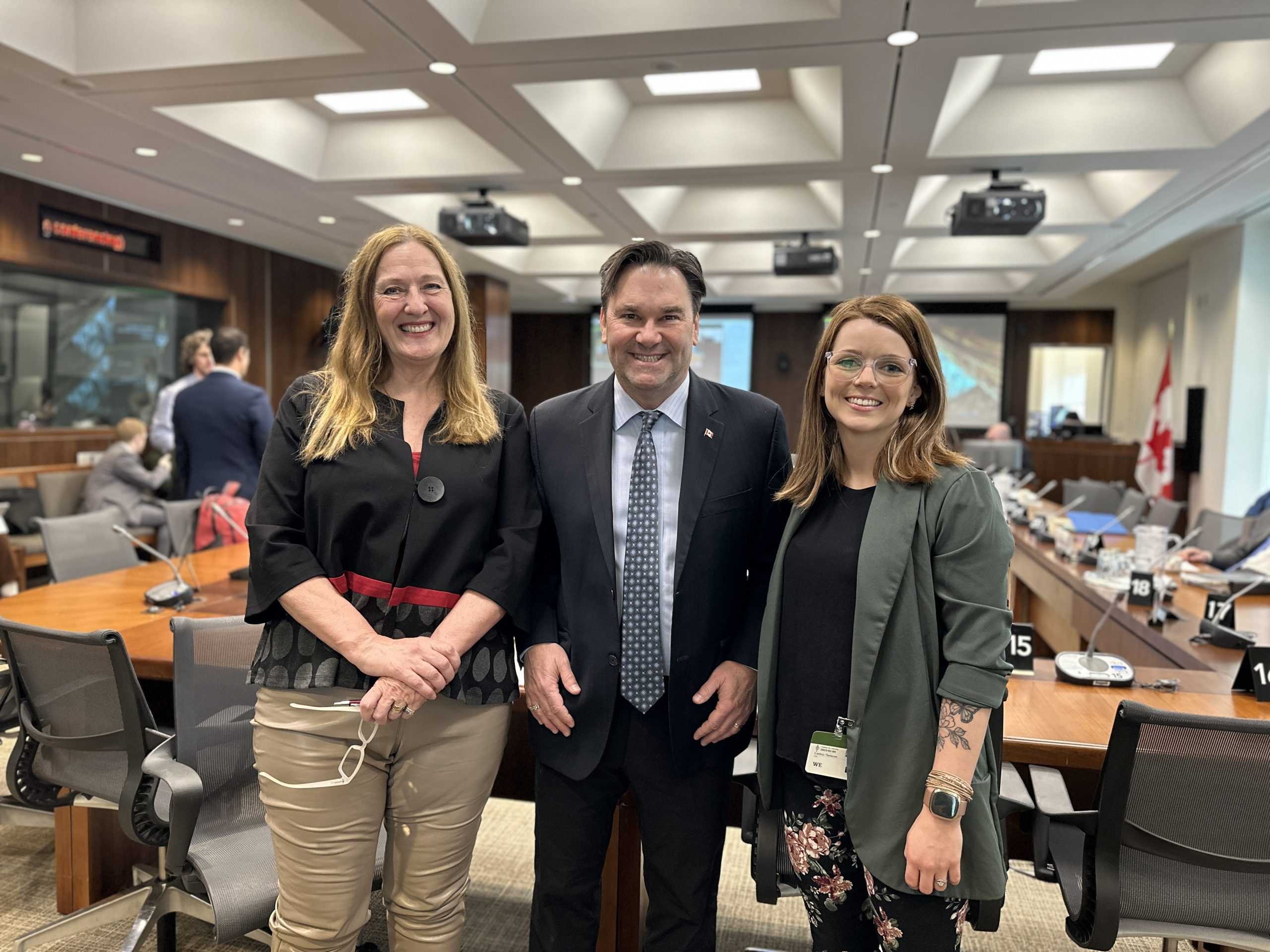
Lindsey Thomson, Jasleen Singh and Kim Hollihan, Meeting with MP Ellis for the Tax-Free Therapy Campaign, June 2023

CCPA actively works to increase access to mental health services across the country, working with provincial and federal stakeholders.
CCPA calls on all parties to ensure the Federal Government encourages equitable access to ALL mental health service providers – including counsellors, counselling therapists and psychotherapists – for ALL Canadians!
Canadians face barriers to accessing timely, effective, and qualified mental health care support provided by counsellors/counselling therapists/psychotherapists through federal health benefit programs and legislation. Without consistently recognizing qualified counsellors/counselling therapists/psychotherapists in all federal plans and provinces, this leads to preventable delays in obtaining mental health support, inequality in access to care based on province of residence, and lack of continuity of care as clients transition from one federal plan’s coverage to another or from one province to another.
The Canadian Counselling and Psychotherapy Association (CCPA) recommends three legislative and easily actionable ways that the Federal Government can ensure consistency in federal recognition of counsellors/counselling therapists/psychotherapists and prevent avoidable gaps in the accessibility of federal mental health supports.
Learn more about each of our three recommendations below, and visit our Professional Practice Documents webpage to browse our submissions to the Federal Government.
Counsellors and psychotherapists are currently NOT exempt from charging GST/HST. CCPA encourages members to learn more about their tax obligations through the Canada Revenue Agency’s website.
Taxation is a federal matter, and as the largest national association for counsellors and psychotherapists, CCPA has been advocating for the removal of tax on counselling and psychotherapy services since 2004. The Excise Tax Act (ETA) lists professions and services that are exempt from charging GST/HST; in order for counsellors and psychotherapists to be listed as exempt medical professionals in the ETA, the profession must be regulated as a health profession in at least five provinces or territories.
As such, CCPA has taken a leadership position in supporting regulation of the profession of counselling and psychotherapy across Canada through our involvement in provincial federations and coalitions, as well as providing opportunities for said federations and provincial regulatory colleges to come together to collaborate on shared priorities.
In the last decade, CCPA has supported a number of provinces in regulating the profession of counselling and psychotherapy: Nova Scotia (2011, Registered Counselling Therapist), Quebec (2012, Psychotherapy Permit), Ontario (2015, Registered Psychotherapist), New Brunswick (2017, Licensed Counselling Therapist) and Prince Edward Island (2021, Counselling Therapist). Despite receiving royal assent in 2018 to regulate the profession, Alberta is still awaiting proclamation as the final step in the regulatory process.
Furthermore, in 2017, CCPA supported a private member’s bill by MP Pierre-Luc Dusseault to amend the ETA and exempt counselling and psychotherapy services from GST/HST. Listen to the press conference with MP Dusseault and CCPA and read Bill C-383:
Unfortunately, an election was called before MPs could vote on the bill. Dusseault’s interest in this issue did, however, lead to an invitation to appear before the House of Commons Finance Committee to speak to CCPA’s annual pre-budget submission which included a recommendation on GST/HST exemption:
At the time that Alberta received royal assent and would have been the fifth province to regulate the profession, CCPA applied for the counselling therapy/psychotherapy profession’s exemption in the ETA through the Department of Finance. The application was declined because the regulated provinces did not regulate the same professional title. Despite documentation and discussions that demonstrated how the professions share a common scope of practice even though different professional titles are used, the profession is not eligible for the exemption because the provincial legislation that regulates the professions does not use the same title and scope of practice language in describing the professions.
For a summary of the advocacy work on this issue, please consult our GSTHST Infographic. CCPA continues to advocate for tax exemption in our annual pre-budget submissions to the House of Commons Standing Committee on Finance and Department of Finance, as well as meetings with Federal Members of Parliament on this issue.
In Spring 2021, CCPA’s member advocacy survey provided valuable information about the GST/HST practices and barriers of members, and helped inform key advocacy messages on the GST/HST matter. Staff met once again with the Department of Finance in 2021 to explore alternatives to obtaining an exemption for the profession in the ETA. The meeting unfortunately did not result in a GST/HST exemption for the profession, but once again helped inform next steps in CCPA’s advocacy plan on this issue.
During the 2021 federal election, CCPA launched a successful letter-writing campaign to all candidates across Canada. The campaign included one letter devoted to the GST/HST exemption for the profession of counselling and psychotherapy.
Federal advocacy will continue to include meetings with Members of Parliament to raise awareness on the issue of unequal access to mental health care services provided by counsellors and psychotherapists, as well as submissions to relevant House of Commons Committees and meetings with policy makers at the Department of Finance and Canada Revenue Agency. Please see the our website for the most recent submissions to the House of Commons Standing Committee on Health, House of Commons Finance Committee, Department of Finance and more!
CCPA also continues to support regulation of the profession across Canada; we will re-apply for exemption once the fifth province regulates the counselling therapist or psychotherapist title with the aim of ensuring that practitioners of both titles obtain an exemption under the ETA. Stay up to date on the process of regulation through the summary and links on our Regulation page.
In the meantime, we continue to work on achieving recognition from the Department of Finance that the counselling therapy and psychotherapy professions in regulated provinces are the same profession in all but name.
There is a significant need for improved access to qualified professional mental health support for the Indigenous Peoples of Canada. Attempts at assimilation have contributed to mental health challenges for First Nations, Inuit, and Métis peoples, which, in turn, have led to harm in Indigenous communities. The loss of their culture, identity and self-determination has had profound and lasting impacts on their mental well-being.
The Non-Insured Health Benefits Program (NIHB) and the Indian Residential Schools Resolution Health Support (IRS RHS) Program provide registered First Nations and recognized Inuit with coverage for a range of health benefits, including mental health counselling.
CCPA’s Canadian Certified Counsellors (CCCs) were eligible service providers under NIHB and IRS RHS programming until May 2015 when the designation was delisted in all provinces and territories where the profession of counselling/psychotherapy is not regulated. CCCs are only accepted in exceptional circumstances in rural and remote areas and on a limited basis.
This decision has significantly reduced appropriate, universal access to mental health counselling services for Indigenous Peoples and communities across the country, and disadvantages those requiring care in unregulated provinces and territories.
By restricting access to CCCs, who are eligible providers in various other Federal health benefit programs as well as though the First Nations Health Authority which is NIHB’s counterpart in BC, the Federal Government is not providing equitable access to mental health care for all Indigenous Peoples.
The current NIHB policy prevents Indigenous practitioners from working in their communities and traditional territories, and within the cultural areas in which they are experts. The mental health benefit is the fastest-growing benefits area in the plan. Indigenous People must have access to practitioners who are from their own community with lived experience and understanding of the socio-political influences that impact Indigenous lives and mental health every day.
In September 2015, in response to the delisting of CCCs in unregulated provinces, the Assembly of First Nations (AFN) – First Nations Inuit Health Branch (FNIHB) NIHB Joint Review Steering Committee recommended immediately reinstating CCCs as eligible providers in provinces and territories that have not regulated the profession.
As highlighted in rights instruments and national commissions on Indigenous people, like the Truth and Reconciliation Calls to Action, the United Nations Declaration on the Rights of Indigenous Peoples and the National Inquiry into Murdered and Missing Indigenous Women and Girls, each item demonstrates increasing access to mental health supports. However unilateral decisions are still being made by federal and provincial leadership on Indigenous communities and access to essential services.
In the interest of equitable accessibility to mental health services for Indigenous Peoples of Canada, it is recommended that Indigenous Services Canada implement the call to action from the AFN-FNIHB Joint Review Steering Committee and immediately reinstate CCCs in unregulated provinces as eligible providers under the NIHB program, adding over 1,500 eligible providers in the unregulated provinces.
In May 2022, Angela Grier, CCPA’s Lead, Indigenous Initiatives, appeared as a witness in front of INAN to talk about this issue. Listen to her testimony here: https://youtu.be/HKv-xSiW1Cs.
For a one-pager on the issue, click here.
While a ten-year agreement was presented by the federal government and accepted by the provinces and territories in February 2023, CCPA was deeply disappointed that it did not contain the long-promised Canada Mental Health Transfer of $4.5 billion over 5 years. The agreement allocates $25 billion over the next 10 years has been set aside for four specific priorities, of which mental health and substance use health is one – but no bilateral agreement, action plan, priorities, funding allocation or expected impact have been signed to-date. We look forward to seeing the details of each agreement that is signed between the federal and provincial and territorial governments.
CCPA believes that appropriate and sustainable levels of federal funding should be embedded within a new legislative framework that identifies a clear set of objectives and accountabilities (e.g., guiding principles, performance indicators, national standards) that need to be adhered to by the provinces and territories in order to receive ongoing funding.
To provide for a more transparent and mutually accountable relationship between the federal, and provincial and territorial governments, CCPA continues to call on the federal government to pass a companion piece of legislation to the Canada Health Act called the Mental Health and Substance Use Health Care for All Parity Act.1
The Act calls on the federal government to:
The Canadian Counselling and Psychotherapy Association (CCPA) is a national bilingual association that promotes the profession of counselling and psychotherapy and its contribution to the mental health and well-being of all Canadians. CCPA is available to the media to speak on matters related to the role of the profession in all healthcare, educational and industry sectors; contact us to arrange an interview with one of our spokespersons.
For media requests, please contact:
Laura Rinaldi
Impact Public Affairs
CCPA is committed to recognizing and supporting various special days and weeks throughout the year, both nationally and internationally, by issuing press releases to the media to highlight these important events. In many cases, the release results in an interview with a CCPA expert on radio, television or in the print media. In this way, CCPA is helping to raise awareness of issues that affect the profession, while promoting the services offered by counsellors and psychotherapists and sharing valuable resources, such as the Association’s Let’s Talk website, which is designed to help people living with mental illness and mental health issues.
You will also find in this section relevant news releases from national groups that CCPA supports and belongs to (such as the Canadian Alliance on Mental Illness and Mental Health) or other organizations (such as the Mental Health Commission of Canada).
February 6, 2023 – Canadian School Counselling Week 2023
April 3, 2023 – Second Annual Counselling and Psychotherapy Month
May 1, 2023 – CCPA Celebrates CMHA Mental Health Week
May 5, 2023 – Day of Recognition, Missing and Murdered Indigenous Women and Girls
Sep 10, 2023 – World Suicide Prevention Day
October 1, 2023 – Responding with Kindness : CCPA Recognized Mental Illness Awareness Week
November 1, 2023 – Out of the Shadows: Domestic Violence Awareness Month
November 19, 2023 – A Heavy Load to Carry: National Addictions Awareness Week
November 22, 2023 – Minister of Finance Announces Tax Exemption for Psychotherapy and Counselling Services
October 24 – CCPA Asks the Federal Government to Re-Instate CCCs within the NIHB Mental Health Program
October 12 – CAMIMH Sixty-five Organizations Call on Federal Government to Immediately Establish the Canada Mental Health Transfer
September 29 – CCPA Honours National Day for Truth and Reconciliation
September 20 – National Coalition calls on Government to Remove GST/HST from Therapy Services
June 21 – CCPA Celebrates National Indigenous Peoples’ Day and Indigenous History Month
May 26 – PBO Report Announces the Cost of Exempting Counselling Therapists/Psychotherapists from GST/HST
May 2 – CCPA Celebrates CMHA Mental Health Week
April 1 – CCPA Launches the Inaugural Counselling and Psychotherapy Month in April 2022!
February 6 – Canadian School Counselling Week 2022: Who We Are and How We Help
December 6, 2021 – Survey Shows Therapists in Canada Have Been Affected by – but are Adapting to – the Pandemic
November 22, 2021 – National Addictions Awareness Week
November 1, 2021 – Canada Career Month (CCM)
October 4, 2021 – Mental Illness Awareness Week (MIAW)
September 30, 2021 – National Day of Truth and Reconcilitation
September 10, 2021 – World Suicide Prevention Day (WSPD)
June 21, 2021 – National Indigenous Peoples Day
May 13, 2021 – CCPA 2021 Professional Champion Award
May 3, 2021 – Mental Health Week
February 1, 2021- Canadian School Counselling Week : School Counsellors Continue to Support Students through a Global Pandemic
November 23 – National Addictions Awareness Week 2020
November 9 – Canada Career Month 2020
October 4-10: Mental Illness Awareness Week 2020
September 10 – World Suicide Prevention Day
July 13 – Mental Health Action Plan
June 18 – National Indigenous Peoples Day 2020
May 4 – Mental Health Week: Dealing with Mental Health and Wellness during COVID-19
February 3 – Canadian School Counselling Week: Building Resilience in Uncertain Times
Lindsey Thomson, Jasleen Singh and Kim Hollihan, Meeting with MP Ellis for the Tax-Free Therapy Campaign, June 2023

Kim Hollihan, meets with the Minister of Mental Health and Addictions, Ya’ara Saks, advocating for CCCs under NIHB February 2024

Roch Courcy and Lindsey Thomson advocating for the inclusion of CCCs at the Canadian Life and Health Insurance Association Conference in Winnipeg, June 2023

Carrie Foster, President of CCPA, MP Davies and Lindsey Thomson, Director of Public Affairs, at the House of Commons Standing Committee on Health for Children’s Mental Health. Advocating for tax free therapy in February 2023
